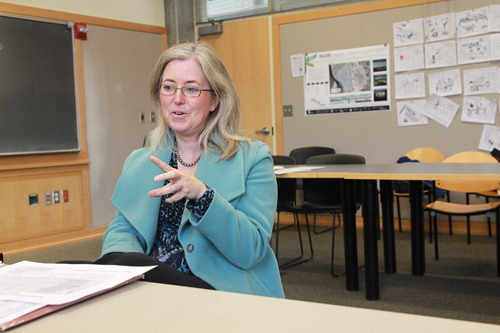Portland State has now successfully developed its own university transportation center—the National Institute for Transportation and Communities—after receiving a $3.5 million grant from the U.S. Department of Transportation. The grant will allow the new center to continue to pursue objectives in transportation research. The center is a tier-one University Transportation Center designated by the DOT and will create a partnership between PSU, University of Oregon, Oregon Institute of Technology and University of Utah.
PSU’s National Institute for Transportation and Communities receives $3.5 million grant

Portland State has now successfully developed its own university transportation center—the National Institute for Transportation and Communities—after receiving a $3.5 million grant from the U.S. Department of Transportation. The grant will allow the new center to continue to pursue objectives in transportation research. The center is a tier-one University Transportation Center designated by the DOT and will create a partnership between PSU, University of Oregon, Oregon Institute of Technology and University of Utah.
The institute was one of 22 university groups from all over the nation to receive the grant. It is an extension of an already existing transportation group at PSU, the Oregon Transportation Research and Education Consortium. With the new grant and previous grants awarded to OTREC, PSU has received $19.5 million in grants for transportation research, making it one of the most highly funded grant areas in recent years.
“The [University Transportation Center] competition was national in scope; only 22 were awarded. I think it speaks very highly of the body of work that PSU and our partner institutions have delivered. It is also rewarding that I know that we are creating opportunities for PSU students. Since I benefited from the UTC program as a graduate student myself, I really enjoy that aspect,” said Christopher Monsere, OTREC researcher and assistant professor at PSU.
Monsere explained that the new institute will provide opportunities for students interested in transportation research. “NITC supports students in many ways. On my research projects I typically involve at least one graduate student and undergraduate student,” Monsere said. “NITC also supports our transportation student group [Students in Transportation Engineering and Planning]. Students get to travel to conferences and other educational opportunities through this support,” he added.
“I bring the research back to the classroom both at the undergraduate and graduate level. I really believe that being research-active really enhances the quality of my teaching,” Monsere said.
According to Monsere, Portland’s variety of transportation options and interests provides unique transportation research opportunities. “We have a real advantage in the Portland region with inventive, cutting edge agencies that are on the forefront of so much thinking in the transportation area,” he said. “This gives me as a researcher access to projects, data, and other information. In return, we help the agencies study problems that have local, regional and national significance. All of my projects have involved substantive collaboration with agencies such as Portland Bureau of Transportation, Oregon Department of Transportation, Metro and others,” Monsere said.
At a local level, the new institute aims to research and produce data related to transportation, which will then be used to develop the Portland community. But the larger goals of the NITC are to develop research that can be applied nationally. It is also looking to involve the community in its work and to engage Portland residents in their own transportation issues and needs.
“In short, the goals of NITC are to provide research on sustainable transportation to inform policymakers and transportation professionals and offer education programs for the current and future transportation workforce,” said Justin Carinci, communications director for OTREC.
While the two transportation groups will be working together on similar projects, the NITC has a more specific focus than the larger, broader goals of the Research and Education Consortium. “Our theme is narrower: in general, I’d say more focus on bikes, pedestrians and transit and less on highways and bridges,” Carinci said.
Institute projects will look to increase safety of transit users, increase understanding of bicycle, pedestrian and public transit, develop new tools and resources for examining data, and to begin developing a better understanding of how transportation and emissions are involved with climate change.
“We’re reaching out right now to researchers at all four universities to let them know about NITC and how to apply. We’re hoping for as wide a range of proposals as possible from many different fields, not just engineering and planning, which tend to be the biggest fields in transportation research,” Carinci said.
The NITC is currently accepting applications for research projects. The deadline for proposal abstracts is April 13 and full proposals for projects are due May 4. The development of the selected projects will begin Aug. 31, 2012 and they are expected to be completed by Dec. 31, 2013.





